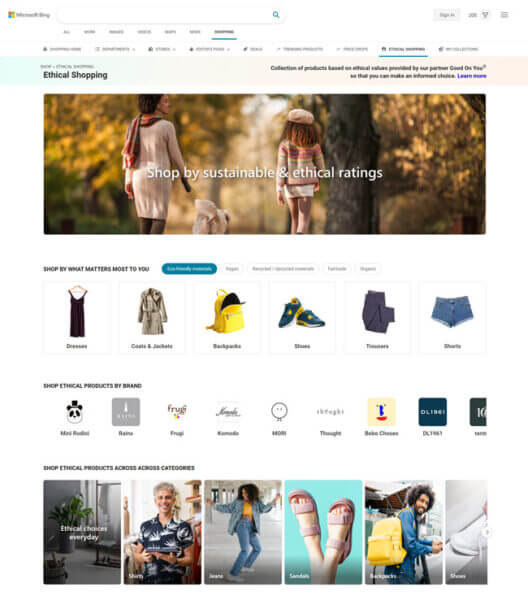Bing launches Ethical Shopping hub in UK
The hub is expected to roll out in the U.S. next year and Microsoft is looking to extend it beyond the fashion vertical.
Microsoft Bing has launched its Ethical Shopping hub, which enables users to shop eco-friendly, upcycled or fair-trade fashion, the company announced Wednesday. The Ethical Shopping hub is currently only available to desktop users in the UK. “Currently, we are looking at a horizon of at least another quarter before a significant release in the U.S.,” Sumit Chatterjee, lead product manager at Microsoft, told Search Engine Land.

Why we care. Fashion brands that create sustainable products are the clear winners here. Although this iteration of the Ethical Shopping hub is limited to fashion products, Microsoft is looking into expanding it to more categories, which may provide more ethically-minded businesses with opportunities to get their goods (and values) in front of consumers.
Brand values have only grown more important over the last few years and consumers may be factoring their ethics into purchasing decisions. Amazon already has a similar feature, its Climate Pledge Friendly search filter, so it may be possible that Google releases its own version of ethical product search in the future as well.
How it’s different from Bing Shopping. Consumers can use the Ethical Shopping hub to browse by ethical fashion brands or products as well as trending and featured items. As mentioned above, they can also narrow down their options using the eco-friendly, upcycled and fair-trade options. Additionally, the hub will also feature articles about “informed fashion choices and other planet-friendly news topics,” according to the announcement.
The price drop and sales labels that are available on Bing’s traditional shopping experience will also be shown in the Ethical Shopping hub, so product feed data will continue to play an important role here as well.
How products eligibility is determined. Sustainable and ethical ratings are powered by Good On You, an organization that compiles and rates fashion brands based on their impact on people, animals and the environment.
“Information is gathered from brand and parent company credible reporting, third-party indices (e.g., the Fashion Transparency Index and CDP Climate Change and Water Security projects), and independent certifications, accreditations, and other standards-based systems (like Fair Trade, Cradle to Cradle, OEKO-TEX STeP and the Global Organic Textile Standard),” Microsoft said in the announcement.
These ratings are integrated into Bing Shopping filters and users can apply them when searching for fashion products.







